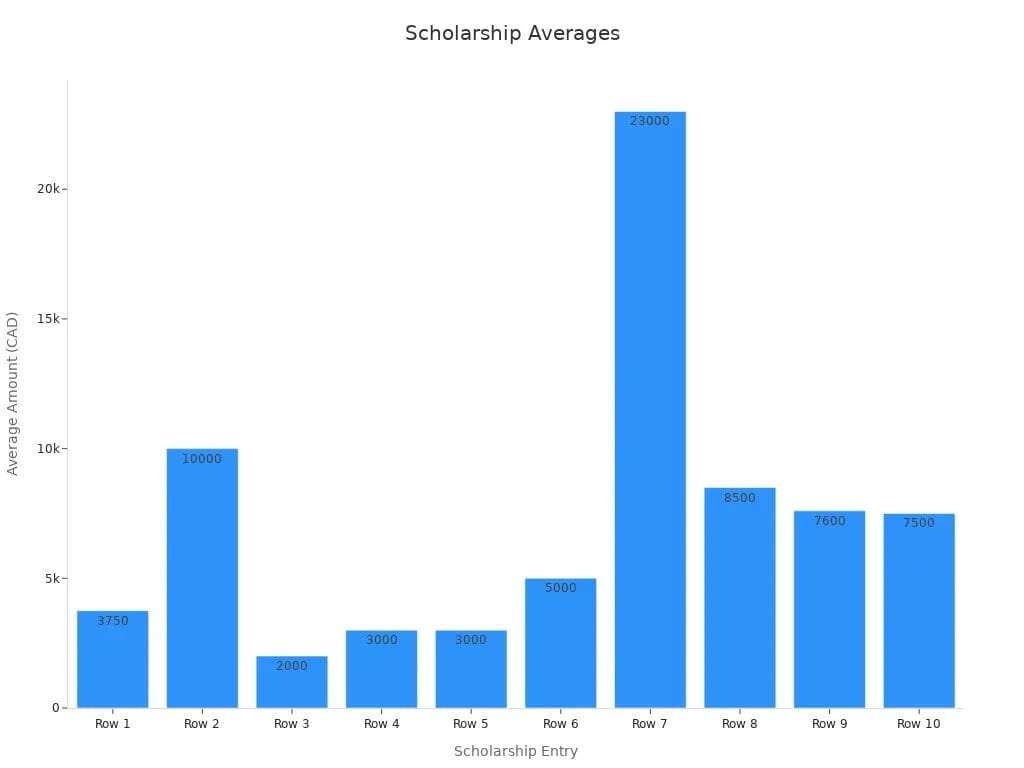
scholarships in Canada for international students can help. Canada has many ways for international students to pay for school. There are government programs and awards from universities specifically designed for international students. These scholarships work for undergraduate, Master’s, or doctoral programs.
Start looking for scholarships in Canada for international students early. The sooner you start, the better your chances. Spend time checking your options and getting your application ready. Studying in Canada might be easier than you think!
Start looking for scholarships early to improve your chances. Begin searching at least one year before you plan to study.
Learn about the types of scholarships: government, university, and private groups. Each has its own rules and benefits.
Get your application papers ready ahead of time. You’ll usually need grades, recommendation letters, and proof of English skills.
Change each application to fit the scholarship’s purpose. Write essays and statements that show your goals and successes.
Stay organized while applying. Use a checklist to keep track of deadlines and papers so you don’t miss out.

Canada has many scholarships to help international students with school costs. These scholarships are grouped into three types: government-funded, university-specific, and private/non-profit. Let’s look at each type to see what they offer.
Government-funded scholarships are some of the best options. They aim to bring talented students from all over the world. These scholarships support students in advanced degree programs. Popular ones include:
| Scholarship Name | Average Amount (in CAD) |
|---|---|
| Vanier Canada Graduate Scholarships | 50,000 per year |
| Banting Postdoctoral Fellowships | 70,000 per year |
| Canada Graduate Scholarships (Master’s) | 17,500 |
| Ontario Trillium Scholarships | 40,000 per year |
These scholarships often pay for tuition, living, and research costs. To get one, you need great grades and strong English skills. Some are given when you start school, while others need you to keep doing well.
Many Canadian universities have scholarships just for international students. These awards are based on good grades and help lower tuition fees. For example:
| Scholarship Amount Range | Eligibility Criteria |
|---|---|
| $1,500 CAD to $6,000 CAD | 80% to 95% or higher in grade 12 exams |
| $10,000 CAD | N/A |
| $6,000 CAD to $40,000 CAD | N/A |
Schools like the University of Waterloo give scholarships to undergraduates with at least 90% admission averages. These awards range from $1,000 to $40,000 CAD, depending on your grades and program.
Private groups and non-profits also give scholarships to international students. These often focus on certain subjects or community work. Examples include:
You can find these scholarships through groups in your country, schools in Canada, or private organizations. They are a great way to pay for school and meet people in your field.
Applying for scholarships in Canada can feel hard at first. But breaking it into smaller steps makes it easier. Whether it’s government, university, or private scholarships, a clear plan helps.
Follow these steps to apply for scholarships:
By following these steps, you’ll stay organized and improve your chances.
A good application helps you stand out. Use these tips to make yours better:
By using these tips, you’ll create a strong application. Hard work now can lead to amazing chances to study in Canada.
When applying for scholarships in Canada, knowing the rules is important. Each scholarship has its own conditions. Most fall into three groups: academic performance, financial need, and field-specific focus. Let’s explain these so you’re ready.
Many scholarships care about your grades. If you have good marks, you’re off to a great start. Some programs need a high GPA or strong test scores like GRE, GMAT, or SAT. You might also need to prove your English skills with tests like IELTS or TOEFL.
Here’s a simple list of common academic needs:
| Criteria | Description |
|---|---|
| Academic excellence | High grades or top scores in tests like GRE or SAT. |
| Language proficiency | Show English or French skills with tests like IELTS or TOEFL. |
| Admission to a Canadian institution | Get accepted into a recognized Canadian university or college. |
| Letters of recommendation | Letters from teachers or employers to support your application. |
If you meet these, you’re on the right path. Keep your grades high and prepare documents early to avoid stress.
Tip: Ask teachers or mentors for recommendation letters early. A strong letter can really help your application.
Not all scholarships are about grades. Some focus on helping students with money problems. To qualify, you’ll need to show proof of your financial situation. This could include bank records or family income details.
Here’s how to get ready for these scholarships:
These scholarships can help if you’re worried about costs. They’re worth checking out if you need extra support.
Some scholarships are for certain fields of study. If you’re studying engineering, healthcare, or the arts, you might find scholarships just for you. These programs look for students passionate about their field or with experience.
Here’s what these scholarships often ask for:
| Criteria | Description |
|---|---|
| Research experience | Past research or plans for future studies. |
| Field expertise | Interest or experience in the field, like internships or projects. |
| Community involvement | Activities related to your field, like volunteering or contests. |
To stand out, share your achievements and experiences. Mention projects or volunteering you’ve done. These show your dedication and make your application stronger.
Note: Some field-specific scholarships include mentorships. These can connect you with experts and help your career grow.
By understanding these criteria, you’ll know which scholarships to apply for and how to prepare. Whether you need academic, financial, or field-specific help, there’s an option for you.

Getting a Master’s degree in Canada can change your life. Scholarships make it easier for international students to afford school. Canada has many funding options for students like you. Let’s look at some popular choices and how to apply.
Canada offers scholarships that reward good grades and lower costs. These programs help international students succeed. Here are some top scholarships:
| Scholarship Name | Level of Study | Eligibility | Award | Deadline |
|---|---|---|---|---|
| International Master’s Award of Excellence (IMAE) | Master’s | International students with a minimum 80% average in the last two years of study | CAD 2,500 per term for up to five terms | Application opens in fall |
| Quebec Merit Scholarship Program | Graduate | International students with excellent academic records | CAD 25,000 per year | February |
| Queen’s Graduate Award | Graduate | International students with excellent academic records | Up to CAD 15,000 per year | Check with respective department |
These scholarships for masters in Canada recognize hard work and provide money for school. Check the rules and deadlines for each program to stay prepared.
Applying for scholarships can feel tricky, but planning helps. Use these tips to make your application stronger:
By following these tips, you’ll have a better chance of getting scholarships for masters in Canada. Stay focused and work hard to make studying in Canada possible!
Looking for scholarships can feel tough, but using the right tools makes it easier. Here are some helpful resources and tips to guide you in studying in Canada.
The internet is a great place to find scholarships. Many websites share updated details about funding for international students. Check out these trusted options:
| Scholarship Name | Description | Link |
|---|---|---|
| Banting Postdoctoral Fellowships | For advanced studies in sciences or health in Canada. | Visit Banting Fellowships |
| Pierre Elliott Trudeau Foundation Doctoral Scholarships | For doctoral students in humanities, offering up to C$60,000 yearly. | Visit Trudeau Foundation |
| MPOWER Financing | Provides up to C$10,000 for international students, including refugees. | Visit MPOWER Financing |
| Vanier Canada Graduate Scholarships | Offers financial help to doctoral students in Canada. | Visit Vanier Scholarships |
| John M.Kerr Memorial Bursary Award | Supports 2SLGBTQIA+ students in Alberta with funds. | Visit John M.Kerr Bursary |
These sites are great starting points. Use scholarship databases to find more options. Keep a spreadsheet to track deadlines and requirements. Talking to others or joining forums can also give useful advice.
Tip: Apply to many scholarships to improve your chances. Adjust each application to fit the scholarship’s rules.
Canadian universities are great places to learn about scholarships. Many schools have staff to assist international students. Here’s how to use their help:
Note: Building connections with university staff can help you learn about new scholarships or changes in rules.
By using these tools and tips, you’ll find the best scholarships to help you achieve your dream of studying in Canada.
Canada has many scholarships for students from other countries. These scholarships are for undergraduate, Master’s, or doctoral programs. Knowing the types, rules, and how to apply is important. Begin your search early and stay prepared. Use helpful tools and resources to find the best options. This will increase your chances of getting funding. It can also help you achieve your goal of studying in Canada. Keep trying, and don’t give up!
Check out sites like ScholarshipsCanada, EduCanada, and university websites.
These platforms list scholarships for international students and explain how to apply.
Tip: Save these websites and visit them often for updates.
Yes, you can apply for more than one scholarship. Doing this improves your chances of getting money for school. Make sure you qualify for each one and write applications that fit their rules.
Start as soon as you can, ideally a year before you plan to study. This gives you time to research, prepare documents, and write strong applications.
Note: Many scholarships close months before the school year starts.
